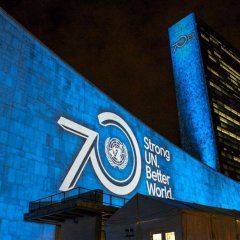World Ocean Radio - Ocean Policy and Governance

Since the creation and ratification of the United Nations Convention of the Law of the Sea (UNCLOS), many international experts have been debating how to create a binding instrument to address marine areas outside of national jurisdiction—the high seas. In this episode of World Ocean Radio, host Peter Neill details the complex and time-consuming process of creating and implementing international ocean policy, and hails the work of the many people who contribute to the process of building an effective, practical, and applicable agreement for the benefit of all.
What does it mean to be accountable for our actions? Individuals are accountable for personal behaviors, commitments, and relationships with those around us. What about corporations? In this episode of World Ocean Radio host Peter Neill questions why corporations are not held to the same standards, and outlines ways in which shareholders and the divestment movement have shown how engaged citizens can encourage and force changes in corporate behavior.
In this fourth and final episode in the "Nature's Trust" series, host Peter Neill highlights two citizens' lawsuits filed against governments for failing to protect the legal right to a healthy atmosphere and a stable climate, using the legal principle of the Public Trust Doctrine to assert that governments are required by law to protect and maintain natural resources for future generations. This episode is part of a series on designing an enduring plan for the future which will protect natural resources such as water, wildlife, and air beyond the challenging circumstances of the 21st century.
What would the American landscape look like if we had no legislation? Would it be habitable today? In this episode of World Ocean Radio we discuss the Clean Air Act, the Clean Water Act, and the Environmental Protection Agency, the foundation of which is the Public Trust Doctrine, which we began discussing last week in Part 1. This episode is part of a series on designing an enduring plan for the future which will protect natural resources such as water, wildlife, and air beyond the challenging circumstances of the 21st century.
How do we organize a civilized response to the needs of a new age? What do we want and how can we achieve it in a democratic society based on the rule of law? In this episode of World Ocean Radio host Peter Neill attempts to answer these questions and more. This is part 1 of a 3-part series on designing a plan for the future which will protect natural resources such as water, wildlife, and air, one which will endure over the challenging circumstances of the 21st century.
Who has a right to life? Only one species? Do humans have the right to exterminate any species they wish? In an effort to combat climate change and the exploitation of the planet’s resources, Bolivia is becoming the first country on Earth to give comprehensive legal rights to Mother Nature. In 2010 the National Congress of Bolivia voted to support an act to protect the well-being of its citizens by protecting the natural world, its resources, sustainability, and value as essential to the common good. In this episode of World Ocean Radio, host Peter Neill explores the language contained in the legislation and asserts that Bolivia may be inventing a social model that will show how we as a global community might transcend conflict and division toward a harmonious and sustainable future.
In 1996, the high level intergovernmental Arctic Council was formed to promote cooperation and interaction among the Arctic states. In this episode of World Ocean Radio, host Peter Neill will outline the Council’s areas of interest and will argue that The Arctic Council could, over time, serve as a progressive model by which to develop policies and management, sustainable development, and protections for other ecosystems and their inhabitants.
Mailboxes fill each day with messages from advocacy organizations with petitions promoting a variety of important causes and ideas. Certain campaigns are hugely successful thanks to the power of social media and the speed with which information travels around the globe. In this episode of World Ocean Radio, host Peter Neill will discuss the evolution of the petition concept and outline some of the most successful international campaigns that have and are making a global difference for climate and the ocean.
The maritime industry is a major index of the health of the global economy and is a significant economic contributor to employment the world over. In this episode of World Ocean Radio, host Peter Neill will outline ways in which the sea serves as a massive system of global activity and will assert that the maritime industry may be a bell-weather of better things to come.
L'industrie maritime est un indice important de la santé économique globale et est un contributeur économique significatif à l'emploi dans le monde entier. Dans cet épisode de la radio océan du monde nous décrivons les manières dont la mer sert de système d'activité globale massif et affirmons que l'industrie maritime peut être un indicateur de meilleures choses à venir.
A indústria maritima constitui um dos principais indicadores da economia global e é simultaneamente um dos maiores empregadores mundiais. Neste episódio do World Ocean Radio destacaremos alguns dos modos como o mar representa um sistema massivo de actividade global e argumentaremos no sentido de considerar esta indústria como um bom indicador de um futuro que se afigura positivo.
La industria marítima es un índice importante de la salud de la economía global y es un contribuyente económico significativo al empleo en todo el mundo. En este episodio de World Ocean Radio delineamos las formas en las que el mar sirve como sistema masivo de actividad global y afirmamos que la industria marítima puede ser un cencerro para cosas mejores a futuro.

